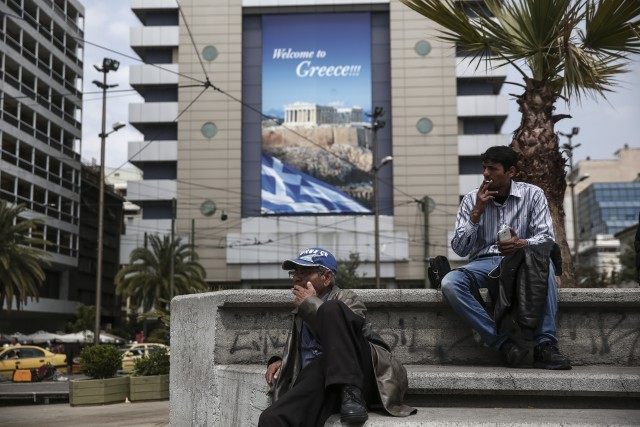Bookmaker William Hill has stopped taking bets on whether Greece will exit the Euro during 2015, saying the country could “begin the process of departing very shortly”. But experts have said that a Grexit could be disastrous for the bloc, spreading contagion to equally indebted countries in the EU.
“Greece had been heavily backed down from 1/5 to be the first to quit the eurozone, and we’d also been shortening the odds for Greece to leave during 2015. They’d come down from 5/1 to 3/1.’ said William Hill spokesman Graham Sharpe, “It is now looking increasingly likely that they could begin the process of departing very shortly.
“No-one is interested in backing Greece to stay in the eurozone until the end of the year, so we decided to pull the plug on the markets until either the decision to leave is taken, or the crisis point passes and a plan is put in place enabling the country to remain in” added Sharpe.
Greek finance minister Yanis Varoufakis has admitted that Greece is struggling to meet its financial obligations, but has lashed out at creditors, who he said were trying to “snuff out” Greece’s ruling Syriza party, the Telegraph has reported.
“Liquidity is drying up in Greece. It is true,” he told a gathering at the Brookings Institution in Washington, accusing creditors of trying to bring his country to breaking point through “liquidity asphyxiation”.
“Toying with Grexit, or amputating Greece, is profoundly anti-European. Anybody who says they know what will happen if Greece is pushed out of the euro is deluded,” he said.
His warnings were echoed by Eric Rosengren, head of the Boston Federal Reserve, who told a group at Chatham House: “I would say to some European analysts who assume that a Greek exit would not be a problem, people thought that Lehman wouldn’t be a problem. If you measured the size of Lehman relative to the size of the US economy it was quite small.
“I wouldn’t be overly confident that just because the Greek economy is small relative to the size of the European economy that something like that wouldn’t be a major dislocation. I think everybody should be a little bit concerned.”
Greece is due to pay €1 billion in debt repayments in early May, but has been seeking a delay. However, Christine Lagarde, the head of the International Monetary Fund (IMF) has ruled that out as a possibility, saying “We have never had an advanced economy asking for payment delays. It is clearly not a course of action that would be fit or recommended.”
Mr Varoufakis told the meeting in Washington: “I would willingly, eagerly, accept any terms offered to us if they made sense. Insisting on a primary budget surplus of 4.5pc in a depressed economy with no functioning banking system is absurd. We have the right to challenge the logic of a programme that has failed.”
Wolfgang Schauble, Germany’s finance minister, told the meeting at the Brookings Institution that Greece’s fate was in her own hands. “If they want to find money somewhere else, whether in Moscow, or Beijing, or New York, that’s fine, we’ll be happy,” he said.
“We will not help a country that refuses to help itself. If Greece wants the next disbursement of €1.8bn, it must fulfil what is agreed. That is called the Memorandum of Understanding.
“There can be no mutual liability in Europe. Providing debt relief and transfers won’t help any country. The problem of moral and political hazard in Europe isn’t some narrow-minded mantra.”
Mr Schauble dismissed the idea that a Grexit could spark contagion, saying “If you look at Greece, it’s not a major part of the economy of the eurozone as a whole. Most participants of financial markets are telling us that markets have already priced in whatever will happen. You can’t see any contagion.”
But Mr Varoufakis insisted that Germany’s proposed solutions would do nothing to solve the problem long term. He said that Greece had gone from “Ponzi growth” to “Ponzi austerity”, adding that nothing would be simpler than to dishonestly sign on the dotted line in order to release another €7 billion of bail out funds.
“It would be the wrong thing to do. It would be wrong for our people and for every citizen of Europe. It would reinforce our image as a bottomless pit. We are not going to sign up to commitments that we know our economy can’t meet,” he said.
“We will not settle for another version of extending and pretending, that gives Greece’s debt-deflation spiral another twirl.
“We have to earn the trust of our European partners, but they must also acknowledge that for five years they have been imposing a programme that makes matters worse. They need to convince us that they’re serious about rebooting.”
Having closed the book on a Grexit, William Hill has now opened a book on a Brexit instead, after polls showed an almost even split in opinion over whether Britain should leave the EU or not. Almost 39 percent of those asked wanted Britain to leave, against 40 percent who wanted to see Britain remain within the EU.

COMMENTS
Please let us know if you're having issues with commenting.